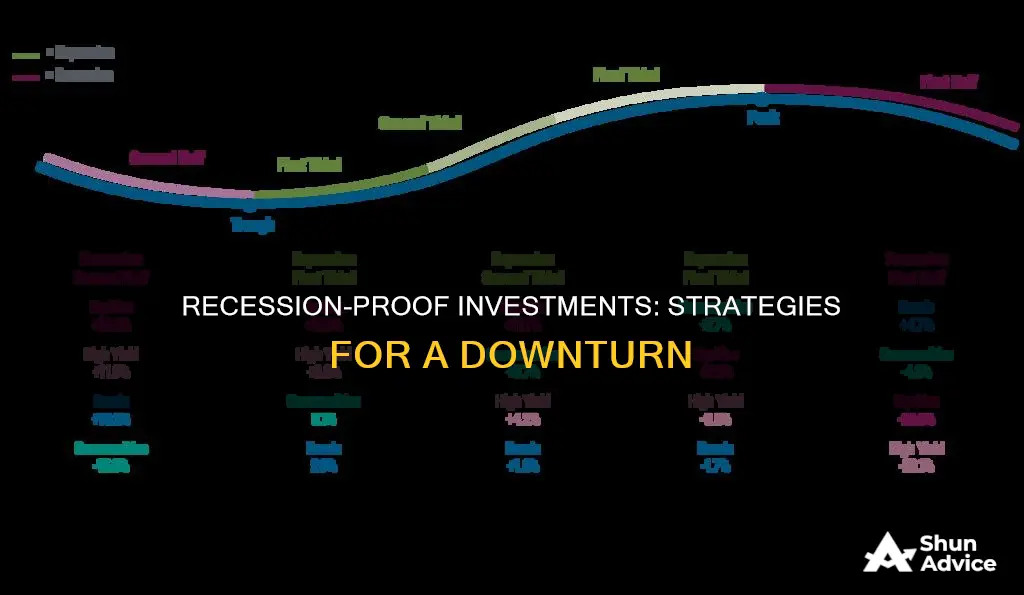
Recessions are a part of the economic cycle, and while they don't last as long as growth periods, they can be costly for investors. A recession is typically defined as two consecutive quarters of negative GDP growth, and it's marked by a decline in consumer and business confidence, weakening employment, falling incomes, and declining sales and production. During these periods, investors tend to become more risk-averse, and certain types of investments tend to perform better than others.
While there is no such thing as a recession-proof investment, here are some options that have historically fared better during economic downturns:
- Defensive stocks in non-cyclical sectors: These include consumer staples (food, beverages, household goods), utilities, and healthcare. People still need essential goods and services regardless of the economic climate, so these sectors tend to be less sensitive to economic downturns.
- Large-cap stocks: Shares of larger, more established companies tend to be less volatile and are generally considered more stable during recessions. They often have more diversified operations and stronger financial positions.
- Bonds: When stock prices fall, bond prices often remain stable or increase. Government bonds, especially from stable, developed nations, are considered low-risk and provide consistent returns during volatile markets.
- Gold: Gold is traditionally seen as a safe-haven asset during economic uncertainty. Its price often moves independently of stocks and can provide a hedge against stock market volatility.
- Cash and cash equivalents: While this strategy may not be ideal for long-term wealth accumulation, having cash on hand can provide a sense of protection and liquidity during a recession. Money market funds and high-yield savings accounts are examples of cash equivalents.
| Characteristics | Values |
|---|---|
| Stocks | Generally one of the worst places to invest during a recession |
| Bonds | One of the best places to invest during a recession |
| Gold | A winning asset class during recessionary periods |
| Large companies | Outperform smaller companies during a recession |
| Defensive sectors | Tend to be less sensitive to economic downturns |
| Dividend-yielding investments | Provide routine cash payments |
| Fixed-income investments | Provide routine cash payments |
| Cash | Provides protection during a recession or market downturn |

Defensive stocks
- Healthcare: Johnson & Johnson, AbbVie Inc.
- Consumer Staples: Coca-Cola Co., Kraft Heinz Co.
- Utilities: NextEra Energy Inc., Duke Energy Corp.
- Discount Retailers: Costco, Target
It's important to note that even defensive stocks can lose value during prolonged periods of market volatility, and past performance does not guarantee future results. However, they can be a good option for risk-averse investors who are looking for more downside protection during market corrections.
Smart, Quick Investment Turnarounds: A Guide to Success
You may want to see also

Large-cap stocks
During a recession, investors tend to panic, cash out their investments, and stop contributing to investment accounts. However, large-cap stocks can be a safer option to protect your portfolio. They are also a good option for investors who don't want to pick individual stocks and instead want to invest in larger, more established companies.
In summary, large-cap stocks can be a good option for investors who want to protect their portfolios during a recession. They tend to be more stable, less volatile, and have a lower risk of going out of business compared to small-cap stocks. Additionally, investing in large companies in defensive sectors can provide some insulation from the economic downturn.
Home Equity Loan: Invest or Not?
You may want to see also

Bonds
Cushion Against Market Losses
Fixed-income assets like bonds act as a cushion for an investment portfolio when the stock market experiences losses. During economic slowdowns, investors typically seek safer investments to reduce the overall risk in their portfolios. Bonds, especially government bonds, are considered safe-haven assets due to their low default risk. As a result, investors tend to shift their money into bonds, driving up their prices.
Lower Interest Rates and Inflation
During a recession, interest rates and inflation tend to fall as the economy contracts. This reduces the risk of inflation eroding the buying power of fixed-interest payments from bonds. Additionally, when interest rates fall, bond prices tend to rise. This is because newly issued bonds have lower yields, increasing the value of existing bonds to match the market's current conditions.
Stable and Predictable Income
Diversification Benefits
Investing in a variety of bonds can help further reduce risk. Diversification can be achieved by investing in different types of bonds, such as government bonds, corporate bonds, municipal bonds, and bond funds. Each type of bond has unique characteristics and risk profiles, so holding a mix can provide a more balanced portfolio.
Capital Preservation
Outperformance During Downturns
Historically, bonds have tended to outperform stocks during recessions and bear markets. For example, during the 2008 financial crisis, global bonds rose by 12%, while the stock market saw significant declines. However, it's important to note that not all bonds perform equally, and some types may experience losses during a recession.
Equity Investment: India's Participation and Prospects
You may want to see also

Dividend-yielding investments
When considering dividend-yielding investments, it is important to look beyond the dividend yield alone. Here are some factors to consider:
- Track record: Look for companies with a solid history of stable or increasing dividend payments. A long and consistent track record of dividend payments indicates a company's ability to maintain and grow its dividend payouts.
- Dividend payout ratio: Examine the company's dividend payout ratio, which is calculated as annual dividend per share divided by earnings per share. A high dividend yield coupled with a low payout ratio indicates that the company has room to sustain or increase its dividend even during challenging economic times.
- Cash flow and financial health: Assess the company's current and future cash requirements. Ensure that the company generates sufficient cash flow and has a healthy balance sheet to meet its financial obligations, including dividend payments.
- Business model and industry: Consider investing in companies with defensive and non-cyclical business models. Sectors such as consumer staples, utilities, and healthcare tend to be less sensitive to economic downturns as people continue to purchase essential goods and services.
- Dividend Safety Score™: Simply Safe Dividends, a platform that provides research and tools for dividend investors, has developed a Dividend Safety Score™ to assess the safety of dividend payments. A "Safe" or "Very Safe" Dividend Safety Score™ indicates a lower risk of dividend cuts.
- Exxon Mobil (XOM): With a remarkable 143-year history of uninterrupted dividends, Exxon Mobil is an energy giant with a diversified business model. Its integrated model, low leverage, and strong credit rating make it a reliable dividend payer even during recessions.
- Procter & Gamble (PG): Procter & Gamble has increased its dividends for 134 consecutive years. With a diverse portfolio of well-known brands, strong advertising, and innovation, P&G has the pricing power to navigate inflation and economic downturns.
- Johnson & Johnson (JNJ): Johnson & Johnson has paid dividends for over a century. Its diverse portfolio of pharmaceuticals and medical devices, along with a conservative financial strategy, has earned it a AAA credit rating.
- Coca-Cola (KO): Coca-Cola has a strong global brand and a vast distribution network. With its products sold in over 200 countries, Coca-Cola has pricing power and a diverse revenue stream, making it a defensive stock during recessions.
- Consolidated Edison (ED): As a regulated utility company, Consolidated Edison provides essential energy services to New York City and the surrounding areas. With a long history of dividend growth and a stable earnings stream, it is well-positioned to continue its dividend payments during economic downturns.
- McDonald's (MCD): McDonald's franchise business model provides a stable income stream. With most restaurants franchised, McDonald's benefits from high-margin rent and royalties, shielding it from some of the challenges faced by the restaurant industry during recessions.
- WEC Energy (WEC): As a regulated utility with a long history and a solid management track record, WEC Energy is well-positioned to maintain its dividend payments. Its predictable earnings and healthy credit rating make it a stable choice during recessions.
Remember, while dividend-yielding investments can provide a hedge during recessions, it is important to assess each company's fundamentals and consider diversifying your portfolio to manage risk effectively.
The Investment Management Division: Roles and Responsibilities
You may want to see also

Gold
However, gold does not always increase in value during a recession. Its performance depends on numerous factors, including market and economic conditions, interest rates, and geopolitical events.
One way to invest in gold is through stocks of gold miners or a gold ETF, such as SPDR Gold Shares (GLD).
Foreign Investment in India: Global Money Magnet?
You may want to see also
Frequently asked questions
Defensive stocks are those in non-cyclical sectors like utilities and consumer staples. They tend to be insulated from economic downturns as they sell essential services and goods such as food, electricity, and shelter.
Gold is often seen as a safe-haven asset during economic uncertainty. It is seen as a hedge against stock market volatility and has a low correlation to stocks. However, the performance of gold depends on various factors, including market and economic conditions, interest rates, and geopolitical events.
Yes, the healthcare and consumer staples sectors typically outperform during recessions. Companies in these sectors sell essential goods and services that consumers continue to purchase regardless of the state of the economy.
Dollar-cost averaging is an investment strategy where you invest a fixed amount regularly, regardless of the price. This strategy helps mitigate risks and maximise benefits when stock prices fluctuate during a recession.
It is generally wise to avoid high-risk assets such as small-cap stocks, cryptocurrencies, and overly leveraged companies. These assets are already volatile during good times and will be even more so during economic downturns.







